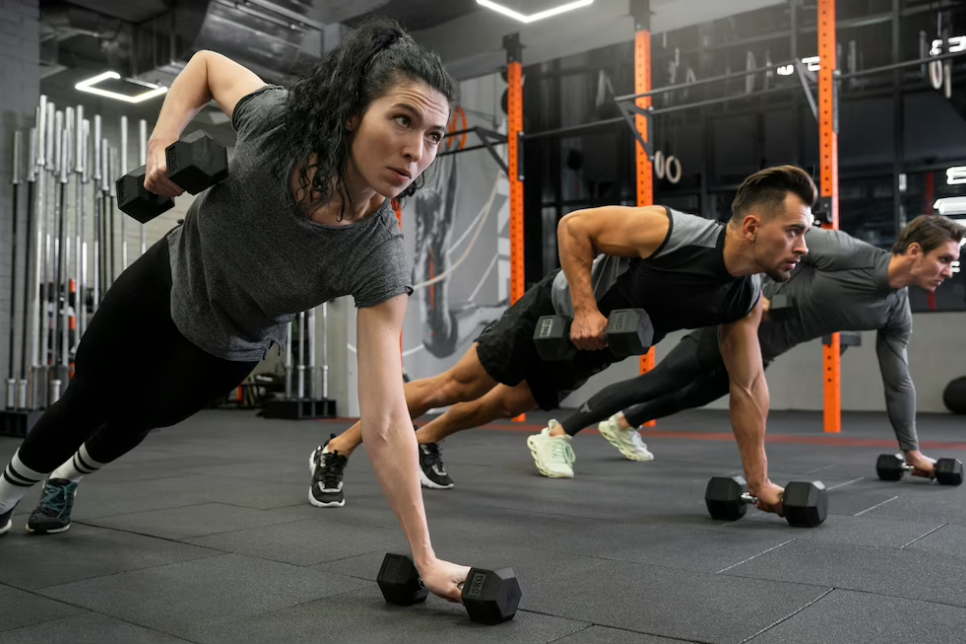For muscle growth, the formula is clear and straightforward: workout, supplement with protein shakes, and build those muscles.
However, what about consuming protein shakes on rest days, without any workout? Will it harm your body? The answer to whether you can drink protein powder without working out is both yes and no.
Yes, you can:
- Enhance the flavor of your shake if it comes in a variety of tastes;
- Increase your protein intake, but don’t expect visible body improvements without exercise.
No:
- Consuming protein without exercise might lead to the accumulation of excessive body fat, as protein contains calories that can contribute to weight gain;
- Protein consumption without exercise might not provide any significant benefits in terms of muscle growth;
- It could result in unnecessary expenses without yielding desirable outcomes.
Protein Intake and Workouts: Exploring Protein Shakes
Protein shakes have long been recognized as effective workout supplements, providing essential amino acids that serve as the building blocks for muscle protein synthesis. If you engage in weightlifting or intense workouts at the gym, your body requires a higher protein intake compared to those with less physical activity.
For this reason, many individuals prefer consuming protein shakes after their workouts to transition their bodies from a catabolic state to an anabolic state, where muscle repair and growth can take place optimally.
Aside from their role in muscle recovery, protein shakes also offer a quick and efficient means of delivering protein to your body. On average, a single serving of a protein shake contains approximately 25 grams of protein and ranges from 101 to 120 calories, making them a convenient option for meeting your protein needs.
Protein shakes differ from meal replacement shakes as their primary goal is to aid in bodybuilding rather than weight loss. These shakes play a vital role in muscle development and toning.
For individuals following a vegan or vegetarian diet, protein shakes serve as a valuable source to enhance protein intake. Additionally, women, who often struggle to meet their protein needs, can benefit significantly from these shakes.
A quality protein shake boasts high protein content while minimizing unnecessary ingredients like carbohydrates, sugars, and fats. In addition, protein shakes are enriched with performance-boosting vitamins that complement your workout routine, enhancing energy levels, endurance, and recovery time.
Optimal Protein Intake Without Regular Workouts
For individuals leading a sedentary lifestyle without engaging in weightlifting or exercise routines, the recommended protein intake is lower compared to those who are active.
Healthy individuals who are not involved in any physical training should aim for approximately 0.36–0.6 grams of protein per pound (0.8–1.3 grams per kg) of body weight. On average, men consume around 56–91 grams of protein per day, while women typically consume 46–75 grams daily.
Tailoring your protein intake to your activity level ensures that you provide your body with the appropriate amount of protein to support overall health and well-being.
Exercise and Protein Shakes: Muscle Growth
Can you build your body just by drinking protein? If you incorporate whey protein shakes into your diet without engaging in any physical training, you won’t be able to effectively gain muscle tissue. Protein shakes work best when your muscles are subjected to stress from workouts. Otherwise, consuming protein shakes without exercising can lead to muscle fiber damage.
For proper muscle repair, your body requires high-quality protein after a workout. Following this restorative process, the body needs time to rest, allowing the muscles to rebuild stronger and healthier.
So, if you believe you can consume whey protein powder without exercising, it’s akin to taking medicine when you’re not sick. It will either be excreted from your body or potentially converted to fat, causing harm rather than benefits. Remember, the combination of protein shakes and exercise is essential for achieving the desired muscle growth and overall fitness goals.
Key Considerations for Optimal Protein Shake Usage
Protein shakes can be a valuable addition to your diet, provided certain considerations are taken into account. Here are three essential points to remember when incorporating additional protein into your nutrition plan:
- Embrace Whole Foods: While protein shakes can complement your diet, they should not replace whole foods as your main source of nutrients. A diverse diet consisting of whole foods is essential to ensure your body receives all the necessary nutrients it requires;
- Strive for Balanced Protein Intake: There is a sweet spot for protein intake where you can maximize its benefits. However, going beyond this point may lead to diminishing returns. Aim to consume around 20–30% of your overall calories from protein to optimize its advantages;
- Prioritize Essential Nutrition: While protein supplements can be helpful, they are not a substitute for a well-rounded approach to nutrition and fitness. Focus on the fundamentals of a balanced diet and regular exercise to achieve your health and fitness goals effectively. Remember, supplements are best utilized as complements to a solid foundation of essential nutrition and physical activity.
The Versatility of Protein Powder Beyond Workouts

While protein powder is commonly associated with workouts and muscle building, it’s important to recognize that building muscle doesn’t solely rely on protein supplements. Achieving muscle growth can be accomplished through a combination of proper training and a well-balanced diet.
Instead of solely relying on protein supplements, incorporating a variety of protein-rich foods into your diet is essential. Whole foods offer a wide array of micronutrients and vitamins that are crucial for supporting your body’s performance during strenuous workouts. Neglecting these micronutrients and vitamins may lead to fatigue and reduced recovery after exercise. Building muscle is a holistic process that involves the right amounts of various essential nutrients, not just protein.
While protein supplements can serve as a convenient option for boosting protein intake, they should primarily be considered as supplements to complement your regular diet. Individuals following a non-vegetarian diet are less likely to face protein deficiencies, but those adhering to a vegan or vegetarian lifestyle may find protein supplementation beneficial.
For vegetarians and vegans who prefer to avoid protein supplements, it is vital to create well-rounded meals that combine various plant-based foods to ensure the intake of all essential amino acids. Foods like Bengal grams, soy, pulses, chickpeas, buttermilk, and beans offer excellent sources of protein to support muscle development and overall health. By carefully planning and diversifying their diets, vegetarians and vegans can obtain ample protein and nutrients necessary for their fitness goals.
The Impact of Whey Protein Without Exercise
When considering the consumption of whey protein, it’s crucial to be aware of its effects on our bodies. Without engaging in any exercise or workout routine, taking whey protein alone can potentially lead to liver or kidney damage. Therefore, incorporating whey protein into your diet should be accompanied by regular exercise or physical activity.
Whey protein is renowned for its role in building muscle mass, but using it without exercising may not yield the desired results. To maximize the benefits of whey protein and ensure its safe usage, it’s essential to combine its consumption with an appropriate exercise regimen. This way, you can harness the full potential of whey protein for muscle development and overall health.
The Impact of Protein Shake Consumption without Exercise

Suppress Appetite with Whey Protein Shakes
One of the notable benefits of consuming whey protein shakes is their ability to reduce appetite. These shakes keep you feeling full for longer periods, curbing the urge to indulge in unhealthy snacks or experience food cravings between meals.
Protein serves as a satiating nutrient, effectively quelling hunger for an extended duration. Incorporating a high-protein diet can provide a heightened sense of satiety.
As a result, protein shakes can be utilized as a meal replacement or as part of a low-carb diet, effectively supporting weight loss efforts.
The next time you find yourself concerned about sudden weight gain, consider switching to protein shakes to efficiently manage your weight and curb unnecessary snacking.
Heightened Risk of Health Conditions Due to Excessive Protein Intake
Consuming an excess of protein without coupling it with a workout regimen can pose significant risks to your health. This practice can be hazardous for the body, potentially leading to certain health conditions. Overindulgence in protein shakes has been linked to an increased risk of conditions such as cancer and osteoporosis.
Considering the potential consequences, it’s essential to assess the balance of your protein intake and avoid unnecessary risks. Prioritize a balanced and mindful approach to nutrition to safeguard your well-being.
Accelerating Aging
The effects of consuming an excessive amount of protein shakes extend beyond mere nutritional concerns. Excessive intake can lead to increased acidity in the body, potentially resulting in a condition known as hyperaminoacidemia. This condition may manifest as symptoms like nausea and diarrhea, causing discomfort and disruption.
Moreover, the accumulation of excessive acid in the body can have a more profound impact, promoting the body’s aging process. As a consequence, individuals who indulge in overly high protein intake without proper balance may experience accelerated aging, contributing to premature aging effects. Careful moderation and balance in protein consumption are vital to avoid potential adverse effects on the body’s overall health and longevity.
Promote Body Aging
The effects of consuming an excessive amount of protein shakes extend beyond mere nutritional concerns. Excessive intake can lead to increased acidity in the body, potentially resulting in a condition known as hyperaminoacidemia. This condition may manifest as symptoms like nausea and diarrhea, causing discomfort and disruption.
Moreover, the accumulation of excessive acid in the body can have a more profound impact, promoting the body’s aging process. As a consequence, individuals who indulge in overly high protein intake without proper balance may experience accelerated aging, contributing to premature aging effects. Careful moderation and balance in protein consumption are vital to avoid potential adverse effects on the body’s overall health and longevity.
Promote Fat to the Body
As we already know, protein contains calories. So, eating too much without a workout can store fat in the body, leading to excessive weight gain. Also, if you top up your protein shakes with added bananas or peanut butter, it will eventually increase the calorie count.
This shows how much extra fat or calories you consume or store in the body when you are not exercising or in any physical activities.
In such cases, you can switch from protein shakes to solid foods, which work better than protein shakes. Protein-rich foods include eggs, fish, chicken, or soy if you plan not to work out.
Promote Unhealthy Ingredients
Protein powder is widely recognized as a beneficial dietary supplement for promoting a healthy body. However, it is crucial to be vigilant as some protein powders available today may harbor unhealthy ingredients that can potentially harm our well-being.
Among the culprits are added sugars, gluten, preservatives, additives, artificial colors, flavors, and sweeteners. These substances are often utilized to enhance the taste and appeal of the product to consumers.
To safeguard ourselves from adverse health effects and avoid unhealthy weight gain, it is imperative to carefully review the nutritional facts of protein powders before consumption. By being mindful of the ingredients, we can make informed choices and ensure that our protein supplement truly contributes to our overall well-being.
Impact on Body pH Balance
For optimal health, it is essential to maintain the pH level of the body within the range of 7.3 to 7.45, which leans slightly towards the alkaline side. However, consuming protein shakes without engaging in physical activity can create an acidic environment within the body.
This acidic state can be detrimental, potentially leading to various diseases, illnesses, and even damage to vital organs and the kidneys. Therefore, it becomes crucial to strike a balance and promote alkalinity to safeguard our overall well-being and prevent the harmful effects of excessive acidity in the body.
Negative Impact on Kidney Health
Too much protein powder alone can lead to kidney problems, especially if you have an earlier condition. This is because protein metabolism takes place in the kidney tract. So, excessive protein in the body can tax those organs.
The accumulation of protein metabolism in the kidney can result in uric acid and creatinine. The kidney purifies the waste products before they are released through the urine. Therefore, whenever you are on a high-protein diet, it can cause stress to the kidneys.
Protein Shakes: Filling Without Exercise?
The feeling of fullness experienced after consuming protein shakes, whether with exercise or without workouts, is considered one of the positive effects of whey protein shakes. These shakes provide a prolonged sense of satiety, helping to prevent unhealthy snacking between meals and curb food cravings.
The satiating property of protein is the key to this phenomenon, as it acts as a nutrient that efficiently suppresses hunger for an extended period. Incorporating a high-protein diet can significantly contribute to feeling satisfied and content after meals.
As a result, protein shakes can be beneficial for those seeking to manage their weight, either as a meal replacement or as part of a low-carb diet strategy for weight loss.
For individuals concerned about sudden weight gain or desiring better weight management, switching to protein shakes can be an effective and efficient solution. Embracing the satiating power of protein shakes without necessarily engaging in exercise can provide valuable support in achieving weight-related goals.
| Health Concern | Potential Consequence |
|---|---|
| Increased Risk of Health Conditions | Raised risk of cancer and osteoporosis |
| Promotion of Body Aging | Hyperaminoacidemia, nausea, diarrhea, and accelerated aging |
| Nutrient Deficiency | Potential lack of essential nutrients from over-reliance on shakes |
| Fat Accumulation | Excessive weight gain and fat storage without exercise |
| Unhealthy Ingredients | Possible harmful additives like sugars, gluten, preservatives, etc. |
| pH Level Disturbance | Creation of acidic environment, leading to health issues |
| Adverse Effects on Kidneys | Strain on kidneys, uric acid, and creatinine accumulation |
Conclusion
Protein supplements, powders, or shakes can effectively support muscle mass growth when combined with resistance workouts. However, without exercise, these protein products become futile and may even lead to adverse effects on the body. Therefore, consuming protein shakes without engaging in a fitness program proves ineffective.
In such instances, opting for solid foods in your diet instead of protein powder allows you to obtain essential nutrients and protein for your body’s needs. Alternatively, embarking on a daily fitness regimen is crucial to fully benefit from protein supplementation.
Drinking a protein shake without exercising is akin to adding a food group to your body and expecting remarkable results without putting in the necessary effort. To make the most of protein supplements, it is essential to complement them with regular workouts and a balanced diet.
